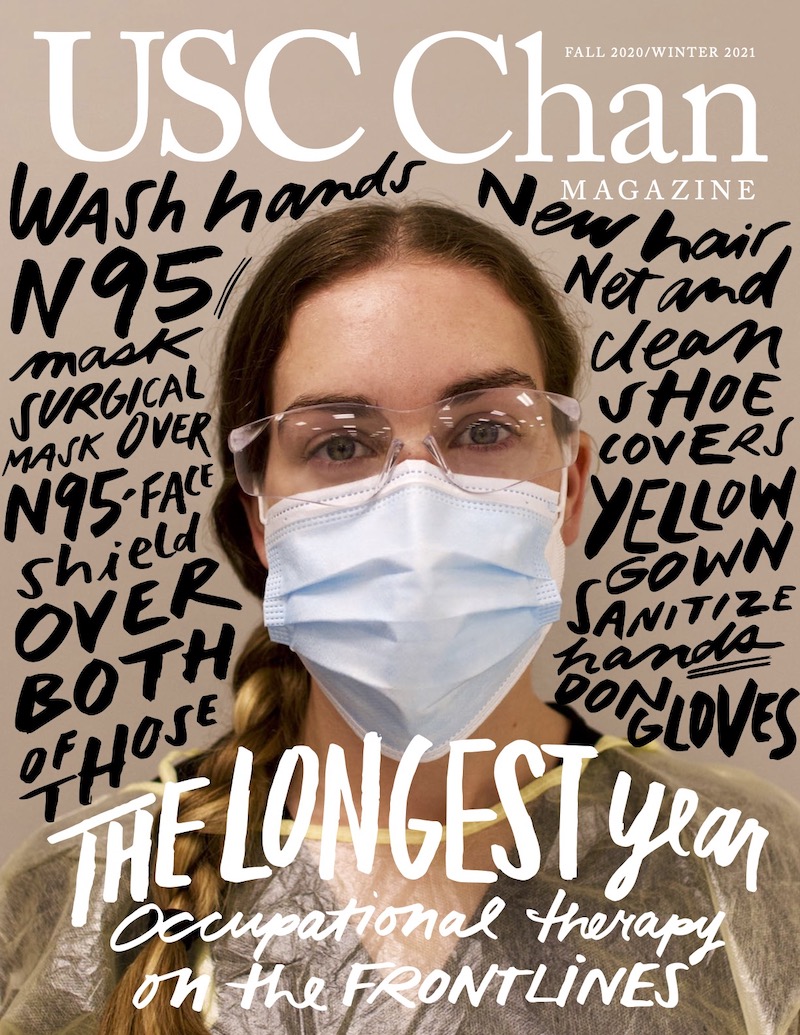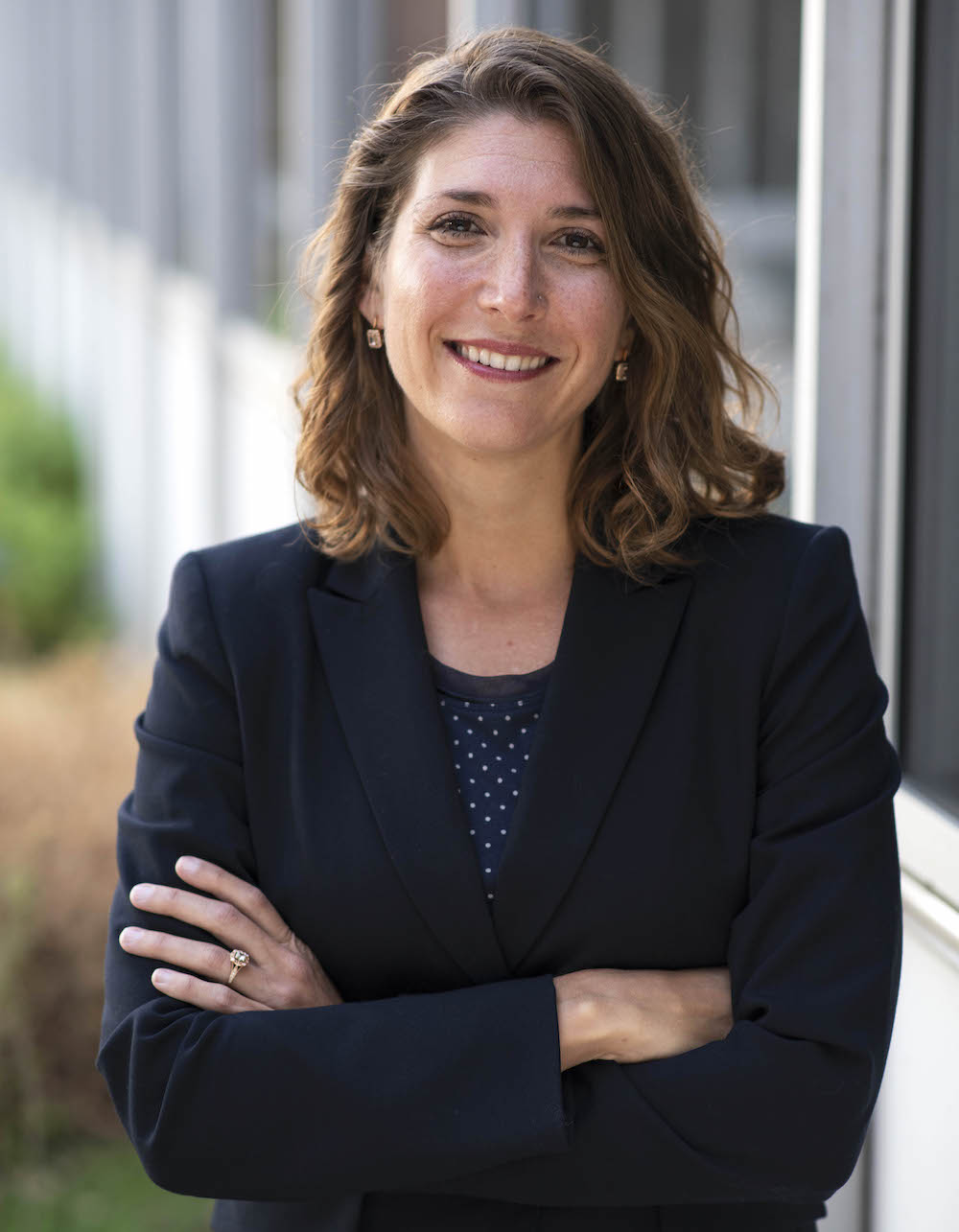Lessons Learned
A new course helps make sense of the pandemic by studying it.
Next to healthcare, no industry has been more severely disrupted by the COVID-19 pandemic than education. When the USC Health Sciences Campus closed, USC Chan faculty members looked to find opportunity in the unfolding crisis — a new graduate-level course that covered, in real time, the pandemic’s impact on people’s occupations, health and well-being.
“The leadership team made an open call for any faculty who might be interested in helping,” says Associate Professor Rebecca Aldrich ’05, MA ’06. “I had already been thinking about the impacts on people who are unemployed, and we’ve seen a lot of them play out over the last several months now.”
After some brainstorming — via Zoom, of course — Aldrich was invited to not only create a new course but to teach it. As she began building its framework, Aldrich made calls around the world to occupational therapists and occupational scientists for their perspectives of the pandemic. It was in that spirit of collaboration that “OT 699: Occupational Innovations for Managing Well-Being and Everyday Life During a Pandemic” began taking shape.
In terms of format and focus, what became most apparent to Aldrich was the need for creativity and flexibility in the face of so many constraints imposed by “the new normal.” The course would consider how occupational therapy practice, occupational science research and an overall occupational lens can contribute to a pressing emergent issue. It met a pragmatic need as well.
“When learning transitioned to the remote platform, we needed to provide an opportunity for our OTD residents to have some substitution for residency hours if they were in sites where hours needed to be reduced,” Aldrich says. “That was really important because it provided a space for residents to continue thinking in ways that were steeped in their residency contexts.”
Product placement
“OT 699: Occupational Innovations for Managing Well-Being and Everyday Life During a Pandemic” was made official in time for the Summer 2020 semester. The purpose of the doctoral-level course was to explore how an occupational perspective can be brought to bear on problems arising from the novel coronavirus pandemic. Run in the style of an ideas lab, it combined guest lectures, pre-selected learning activities and student-generated materials to cover a range of disciplinary and professional perspectives. In lieu of a final examination to conclude the course, OT 699 students designed and pitched occupation-based, evidenced-informed products to meet various needs caused by the pandemic.
“While I was completing my residency with the Los Angeles Unified School District, I noticed that many of the challenges that students were facing involved not having enough resources for them to stay engaged in their homes,” says Faith Hicks MA ’19, OTD ’20. “I knew that all students received technological devices and hotspots, so my ideas were focused on the online learning platform.”
Hicks was inspired by teacher-created “Bitmoji classrooms” — customized, interactive online spaces complete with avatars that mimic in-person classroom experiences.
“I wanted to make something similar and tie it back to OT, so I built an online resource where kids can click on different images which take them to different links, games and outside resources related to fine motor learning, mindfulness, social skills and more.”
Hali Curry MA ’19, OTD ’20 was completing her OTD residency with USC Chan’s autism initiative, so she explored ideas to better serve adolescents and young adults on the autism spectrum. Curry built an infographic for families and individuals with autism to more easily access centralized information.
“I wanted to combine my previous research with what I’ve been working on to provide resources to this age group, because they really don’t have a lot of resources and services,” Curry says. “A lot of what I was reading about was related to providing advocacy skills, supporting self-determination and helping to maintain routines for adolescents and young adults. I wanted my product to be reflective of those needs.”
Tabitha Lin MA ’19, OTD ’20, an OTD resident at City of Hope Hospital located in Duarte, Calif., focused on occupations relating to end-of-life care in acute hospital settings.
“It’s typically so fast-paced that a patient can get transitioned to hospice really quickly, or their condition might be so acute that they’re not appropriate to be seen [by an occupational therapist],” Lin says. “When the pandemic started, I was starting to hear more about the distress that people were going through with not being able to see their loved ones who are dying, whether or not it was related to COVID.”
In response, Lin created a guide offering occupation-based recommendations for families and their loved ones to stay connected.
“I wanted to reinforce that, for people who are dying, they still have a sense of self and a sense of identity, and that they can still have valuable memories and interactions with the ones they love.”
Consistent values in novel creations
For students and instructor alike, OT 699 proved to be a valuable learning experience, one that was intensified by the immediacy of the topics it covered.
“I think that a really valuable aspect of the course is that it made us think way outside of the box,” Hicks says. “It gave us the opportunity to really understand how occupations are being affected by the pandemic and to find ways to creatively address and solve these issues.”
“This class offered a lot of complex and thought-provoking discussions, and I’m grateful to Dr. Aldrich for guiding us through those conversations,” Curry says. “It united us in a shared experience, and gave us that space to really push ourselves to apply our occupational lens.”
“This class gave us a space to think of ways to empower our clients and to empower ourselves in order to address systemic health care disparities and inequities,” Lin says. “It gave us the chance to think about the bigger picture and how we can contribute to the community in spite of the impact of the pandemic.”
The value of OT 699 was accentuated as the pandemic continued to unfold throughout the summer and fall.
“I really want to acknowledge the excitement that surrounded what the students were able to create,” Aldrich says. “The Chan leadership and I were so impressed and proud to see students learn new skills and use their passions to develop something that they could use in the future.”
Aldrich’s future includes another run of OT 699, which returned for the Spring 2021 semester. In the face of so much uncertainty, the coping, healing and sensemaking power of occupation might perhaps be the most important lesson of all.
“There’s still going to be a lot of changes to daily life that are probably going to be different from what we’ve experienced up to this point,” Aldrich says. “We want to be able to tailor the learning experience to what students are living in, because we don’t know what the future holds.”
⋯







